| History - 49th A.I.B. - Company 'C' |
 | Index
|
| Index
| | Next |
| Next |
|
(Pages 05-08)
|
I N T R O D U C T I O N TO B A T T L E |
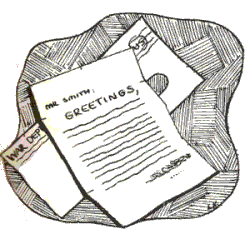
The President had sent out more letters of invitation.
Many men from different parts of the country changed from civilian clothes to nice new O. D.'s. Some of them found their way to Camp Polk, Louisiana during the last weeks of March 1943 and were met by a cadre from Camp Campbell and Fort Knox, Ky. Thus, I Company of the 49th Armored Infantry Regiment was assembled.
By the fifth of April the whole company was formed under the command of Lt. C. E. Smith and basic training
began in earnest. There followed eight weeks of hard, intensive training composed of close order drill, calisthenics, nomenclature of weapons and firing of all individual weapons, etc. The men were kept busy from early dawn to late at night, but good soldiers were molded.
Realizing that all work and no play was bad for morale, three day passes were authorized. Thoughts wandered to Shreveport with "beaucoup women and beverages." Things weren't that easy though. Pass
holders would leave the orderly room make a mad dash the bus station to sweat out a line that never did
seem to get any smaller. After finally getting to
|
Leesville you would find not only all the soldiers in the army waiting in the bus line to Shreveport, but civilians as well. There were never enough buses to take all the men, so many hit the road and others hired taxis but all got there somehow----anything to get away from camp and Leesville. Once in Shreveport, however, all hardships were forgotten. The people were very friendly, the women sociable and the beverages were plentiful. (God Bless the women for what would a soldier do without them.) All good things must come to an end, but this end came too soon. Our Commanding General issued an order to the effect that there would be "no more three day passes." Training had preference over all. That left Leesville as our playground. Plenty of liquor, very few of the fairer sex and loads of clip joints.
Basic was followed by advanced training. This was another eight weeks of hard work consisting of road marches, extended order drill, bivouacs, problems and lest we forget PARADES! Being good soldiers we
were made to utilize the majority of our time to good advantage. Our off time period, which most of the time fell on Sundays, was known as the "Beautification of Camp Polk" or the "Sad Crusade" under the guidance of T/5 Geremino. This was the "Kengla (they are not boys) Regime." The strong who lived through that period will never forget it.
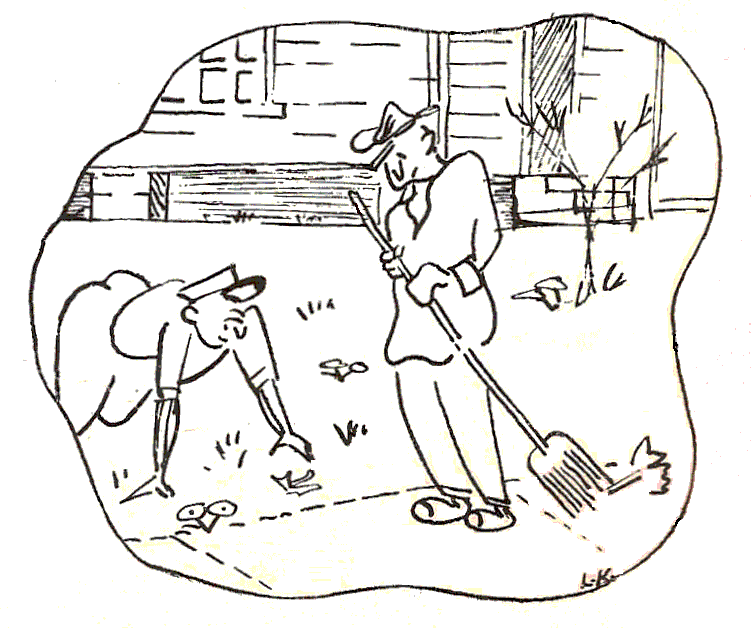
|
-- 5 --
|
Advanced training was followed by furloughs. Those were happy days with fifteen percent of the command away at once. It was the first furlough for the majority of the men and all looked much healthier than when they had first reported to camp.
From combat experience it was decided that Armored Regiments were too large to control in battle thus I Company was redesignated C Compan}' of the 49th Armored Infantry Battalion and we were very fortunate in getting E. W. Clark then a 1st Lieutenant, as company commander.
We were now soldiers, or so they told us, and we set out to prepare for our date with the German. Problems came fast and furious and at the beginning of December we left Camp Polk for three weeks in
the field. That was known as the famous "D" Series. A very touchy subject among the men who came in after it was over but a standby for the old men. Quite an imagination was needed for that series. A mere flag represented anything from a squad to a division. We did learn quite a bit on maintenance and living conditions in the field thanks to the extreme cold and rainy weather.
Christmas time was spent in the field. Married men with wives in Leesville were given a pass to spend the holiday with their families. The rest of the men went to work on making things as comfortable as possible. Some went to work on preparing an altar for services that were to be held Christmas Day. An excellent
job was done. The weather was still terrible, the trees were covered with ice and it rained continuously.
However, we did have plenty of beer and turkey with all the trimmings, and that helped a lot.
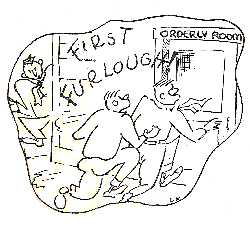
|
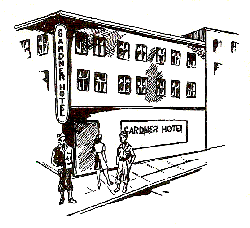
Any of the old men can tell you that those three weeks were really rugged ones. It was then back to Camp Polk, continuation of furloughs and lots more chicken "sugar."
Maneuver time was creeping up on us so we started our packing and preparation of vehicles to carry everything and the kitchen sink. We left Camp Polk the beginning of February with the Fourth Army under
Lt. General Simpson for Louisiana maneuvers with the 44th, 75th, and 92nd Infantry Divisions and the 11th
Airborne Division. Our mission, was mainly one of preparation for combat and becoming accustomed to
living conditions in the field. This was certainly a better assignment than "D" series. At least there was
a visible enemy and not just a flag stuck on some high ground. One of these problems would last four
to five days at a stretch and was then followed by a couple days "break." However, no sooner did a problem
terminate than preparation for inspection started (and there were many inspections). It came to the point
where we were looking forward to the end of the "break" for a rest.
Maneuvers ended April 2nd. Where too now? Our C. G., then Major General Grimes, told us before we left Camp Polk that we would probably never come back. Rumors spread thick and fast. The army wives in Leesville had the facts. They had already taken off for Brownwood, Texas to rent homes, only to get themselves in a jam. Actually we were to go to Camp Bowie, Texas, and the 13th Armored Division, which was stationed there, was to go on to Louisiana maneuvers. However, the War Department called off all Louisiana maneuvers (a wise thing). We were left high and dry. Camp Polk was occupied. No room for us.
|
-- 6 --
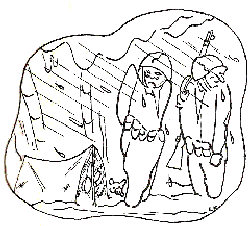
The boys were willing to go home and wait until they did find a spot. What we did do was bivouac outside of Camp Polk at a spot known as Slagle, which was well known as the problem ground. While in Slagle, orders came to clean up Louisiana maneuver grounds. The order was read and re-read. The men were hoping they'd say "wipe out" which would have been a pleasure. (Personally we think that any man who was imprisoned in Louisiana deserves at least a boost of ten points.) You'd be surprised how one ages there. In short order, however, our mission of police up was accomplished. Louisiana was ready to be given back to the Indians as far as we were concerned.
Then came a shock. The army wanted replacements sent out. We lost about one hundred and ten men; men whom we had lived and suffered with, men whom we would have been proud to fight along side of. They
were the cream of the crop. Later we learned that most of them went into action on D Day. The company felt pretty bad about the entire deal, but orders had to be complied with. It wasn't long before we started
receiving replacements from the Air Corps and from ASTP. Those men really took a ribbing, but with all that they turned out to be about the best bunch of fellows you'd ever want to work with. As for being good combat soldiers, later on this book you'll find they come no better.
Orders came to move into South Camp Polk. What a disappointment. It meant Leesville again and all that goes with it. The six months wait for furloughs had ended, the third round started and so did POM.
Charts and more charts, firing, movies, physicals, clothing checks and more clothing checks and RUMORS; What a go-round.
|
Then came packing and crating which meant loads of work. Capt. Clark was made P & C Officer for the Battalion which in reality meant going crazy. As usual our mission, was accomplished. Everything was packed and loaded on trains and off we went. Goodbye to Camp Polk and Leesville.
Our next stop was Camp Kilmer, New Jersey, and everyone thought of New York City and passes galore. As usual it was just the opposite, the company was restricted. Equipment had to be unpacked, lectures
attended, allotments made out and physicals taken. We almost lost a man at that physical. The Medics told
'Scotty' Tetreault that if he were any smaller they would transfer him to the WACS. Eventually twelve
hour passes were issued. Fifty per cent of the company to go at one time. There were a lucky few who had
two evenings in New York, the majority only one. Of course there were a few that managed a third trip via
a hole in the fence only to be caught on the way back. (How about that Sciubba and Laricos?)
Then at long last the gangplank. This was to be the first boat ride for most of the men. All was quiet as the men started to move aboard.
This was it, no more rumors. We were finally leaving the states not knowing when and if we would return. Once aboard ship we were assigned to our cabins. There were about fifty men to a room with walls lined four bunks high. Plenty room for a sardine. The army naturally had to have its training schedule, so one was made up for the trip. Calisthenics in the morning, followed by boat drill and later classes. Everyone had to attend boat drill, sick or not. The sea-sick fell in ranks but headed for the rails in short order. What a beating they took.
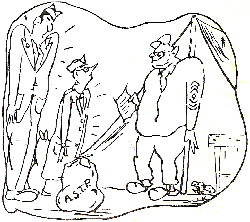
|
-- 7 --
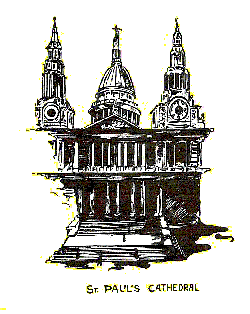
The "garbage skow" in which we had been jammed was HMS SAMARIA, a British vessel. Undoubtedly the worst part of the trip was the food we had to eat. After the "Limeys" had prepared it anyone that was
willing to name it could eat it. There were two meals a day if you were strong enough to digest them. If you
were rich and knew the ropes the meals were excellent at a dollar a throw. (Black Market in other words.)
Finally, we docked at Southampton, England on the nineteenth of November only to be told we would
have to stay aboard another day. The majority of the boys stayed on deck and threw cigarettes to the "Limeys"
that were lined up along the docks.
Late afternoon of the next day we disembarked for our camp at Tidworth. We had heard that the entire division was to be in barracks, so things couldn't be too bad. Upon arriving at our destination we found
all the barracks occupied and headed for tents in the field. It was a miserable night, no lights, plenty of.
rain and ankle deep mud. So this was England! The following days were spent in an attempt to beautify
our tent homes, also winterizing them.
Again passes were issued. This time for London or the never to be forgotten Picadilly Circus. What a spot: Movies, shows, burlesque, and at night the ever present "commandos". Walking around that district at night you would suddenly feel a hand on your shoulder. It wasn't affection, they were just trying to find out your rank. Some of the boys even went sight-seeing.
On the third of January found us ready for the channel-crossing. Rumors were that it would be rougher than the trip from the States. Sgt. Sciubba did enough worrying for the entire company and he also spent
that trip on his back.
We landed at Le Havre, France, and this was our first real sight of the havoc of war. No one spoke everyone just looked and
|
thought of what these people here must have gone through. Finally when the entire company had disembarked we were rushed into G. I. trucks and taken to Totes where we billeted in some vacant homes awaiting further orders.
Our stay there was uneventful except for the time a few boys managed to get their hands on some famous "White Lightning" of which we had heard a great deal about. A few swallows of this potent drink and
the boys "tookoff'. Everyone took cover excepting the few needed to subdue them. That was our first
battle fought on foreign soil.
Orders finally came through to move to the outskirts of Reims in a wooded area. It was snowing and very cold. We were forced to pitch tents in the snow and since the Third Army front wasn't very far off strict light discipline was enforced. This was thought to be it. Expecting to move out and make contact with the enemy, each man was preparing himself mentally for that moment. Again it turned out to be different.
After four days at Reims we moved to Louvigny, France, where elements of the division fighting with the Third Army came in contact with the enemy. We were not committed and took more training on mines, booby-traps and explosives. Training, training, training. We had come to fight! What the hell were we doing
here? II was plenty nerve racking expecting to go in and each time having it postponed.
Still another move, this time to Sibbe, Holland, where we billeted in private homes. We were more than welcomed in the land of 'wooden shoes' and 'windmills'. The Dutch made our stay there very
pleasant.
We could not go much further without making contact with the enemy and the men knew that the day would soon come. Finally ------
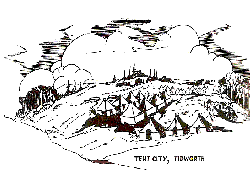
|
-- 8 --
|